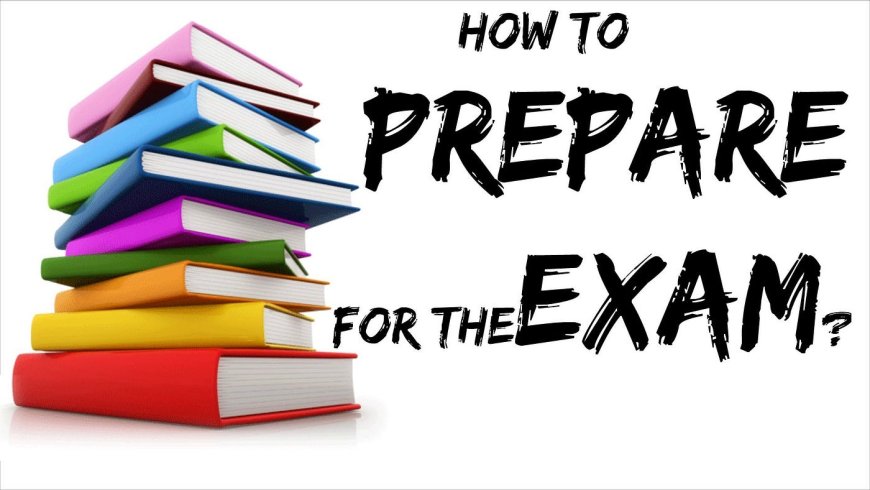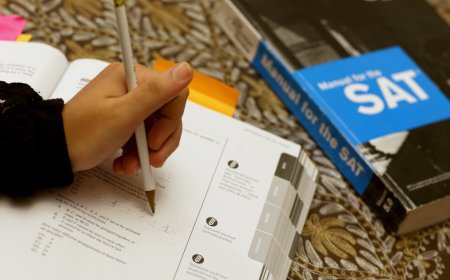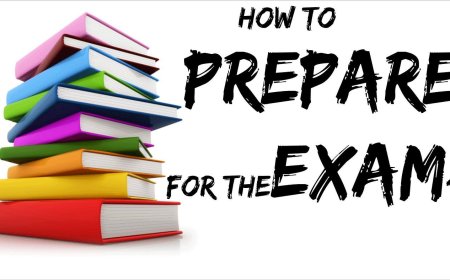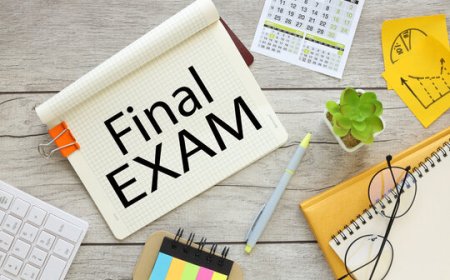Preparing for Grade 12 Exams in Canada A Survival Guide
Get ready for Grade 12 exams in Canada with this practical survival guide—study tips, stress management, and exam prep strategies that actually work.

Preparing for Grade 12 exams in Canada is a critical phase in a student's acade- mic journey, marking the culmination of secondary education and the transition to post-secondary opportunities. The exams are not only pivotal for graduation but also for university admissions and scholarship opportunities, making effective preparation essential for success. Given the pressures associated with this stage, students often seek guidance to navigate the complexities of exam formats, study strategies, and stress management.
The exam structure in Grade 12 varies widely, encompassing multiple choice, essay, short answer, and practical assessments. Each format requires tailored preparation strategies to optimize performance and mitigate anxiety.[1][2] Understanding these formats is crucial, as it informs study habits and time management techniques, ultimately influencing exam outcomes.[3] Additionally, many students face common challenges such as poor time management, cramming, and procrastination, which can hinder their effectiveness and increase stress levels.[1][4]
Notably, the importance of self-care during the preparation process cannot be overstated. Balancing academic responsibilities with personal well-being is vital for maintaining mental and physical health, which directly impacts performance on exam day.[5][1] Consequently, strategies that promote motivation, focus, and effective study habits are integral to enhancing readiness for the challenges of Grade 12 exams.
In light of these factors, this guide serves as a comprehensive resource for Canadian students preparing for their final exams, offering insights into exam preparation strategies, common challenges, and available resources to foster academic success. By implementing effective study techniques and prioritizing self-care, students can navigate this demanding period with greater confidence and resilience.
Understanding the Exam Structure
Understanding the structure of exams is crucial for effective preparation. Different types of exams are administered at the Grade 12 level in Canada, each requiring specific approaches to study and execution.
Types of Exams
Exams can vary significantly in format, including multiple-choice, essay, short answer, and practical assessments. Familiarizing oneself with these formats is essential, as each type necessitates a tailored study strategy. For instance, essay exams might require practice in essay writing and time management, whereas multiple-choice exams may benefit from a focus on key concepts and practice questions[1][2].
Importance of Exam Format
Knowing the format of the upcoming exam can help alleviate anxiety and improve performance. Students should take the time to understand the specific structure of their exams, as this knowledge will guide their preparation and help them avoid unnecessary stress. Reading instructions carefully before commencing an exam can provide critical insights into how to allocate time effectively and approach each question type[1][3].
Practice with Past Papers
Engaging with past exam papers or practice questions related to the subject can be invaluable. This practice allows students to become familiar with the exam's layout and the types of questions they may encounter, thus enhancing their readiness on the exam day[1][2].
The Role of Self-Care
In the midst of preparing for exams, students often overlook self-care, which is detrimental to both mental and physical health. Neglecting self-care can lead to increased stress and burnout, hindering exam performance. Therefore, maintaining
Strategies for Success
To maximize performance, students should adapt their study techniques to align with the specific requirements of their exams. This involves not only understanding the exam types but also seeking clarification from instructors if there are uncertainties regarding the exam format or instructions. Developing a study plan that incorporates regular breaks and self-care practices can lead to a more effective and less stressful study experience[5][3].
Common Challenges in Exam Preparation
Preparing for exams can be a daunting task for many students, especially in Grade
12. Various challenges can impede effective study habits and ultimately affect perfor- mance. This section highlights some common challenges students face during exam preparation and provides strategies to overcome them.
Poor Time Management
One of the most significant challenges students encounter is poor time manage- ment. Without effective planning, students may find themselves rushing through their studies as the exam date approaches, leading to increased stress and anxiety. To combat this, it is crucial to develop strong time management skills and adhere to a structured study schedule[1].
Setting Priorities
Students should identify their priorities and dedicate more time to subjects or topics they find challenging. Focusing on areas that require the most attention can maximize study efforts and improve comprehension[1].
Avoiding Multitasking
While multitasking may seem efficient, it often reduces overall productivity. Concen- trating on one subject or task at a time can enhance comprehension and retention of material, making study sessions more effective[1].
Staying Flexible
Life can be unpredictable, and maintaining flexibility in a study schedule is essential. Adjusting plans as needed and finding new study slots during disruptions can help students stay on track[1].
Cramming
Another common pitfall is cramming, which involves last-minute studying to cover large amounts of material. This practice is generally ineffective, as it often leads to stress and a lack of long-term retention of information. Instead of cramming, students are encouraged to engage in steady and consistent study sessions over time, breaking material into manageable chunks for regular review[1][4].
Spaced Repetition
Incorporating spaced repetition techniques can further reinforce memory. By re- viewing material at increasing intervals, students can enhance their retention and prevent forgetfulness[1].
Procrastination
Procrastination is a frequent challenge that stems from prioritizing short-term comfort over long-term goals. It can lead to unnecessary stress and lower performance on exams. To overcome procrastination, students should break their study sessions into smaller, more manageable tasks, focusing on 20-30 minute intervals rather than overwhelming hours[1][4].
Setting Specific Goals
Setting clear and specific goals for each study session can keep students motivated and on track. Goals should include what topics to cover or specific problems to solve during the session[1].
Understanding the Exam Format
A lack of familiarity with the exam format can also hinder performance. Understanding the structure and types of questions on the exam is essential for effective preparation. Students should seek out past exam papers and practice exams to become accus- tomed to the format and identify areas needing more focus[4][6].
Eliminating Distractions
Creating a conducive study environment is vital. Students should eliminate distrac- tions by turning off their phones and minimizing interruptions, which can significantly enhance productivity during study sessions[1][4].
By addressing these common challenges in exam preparation, students can develop more effective study habits and improve their chances of success in their Grade 12 exams.
Study Strategies
Preparing for Grade 12 exams in Canada requires effective study strategies tailored to individual learning styles. The following techniques can enhance understanding, retention, and overall performance during exams.
Understand Your Learning Style
Recognizing that different study methods resonate with various learning types is crucial. The process of identifying effective study techniques often involves trial and error; students should feel free to adapt their approaches as necessary to find what works best for them[7].
Create a Study Schedule
Establishing a structured study schedule is essential for effective preparation. Stu- dents should assess their workload and set specific, achievable goals for each study session, such as covering particular chapters or solving practice problems[8][9]. By creating a realistic timetable and dedicating time for each subject, students can better manage their time and ensure they cover all necessary material[6].
Active Learning Techniques
Engaging actively with the study material significantly boosts comprehension and retention. Students can utilize techniques like summarizing notes, creating flash- cards, and teaching concepts to peers. Participating in study groups can also facilitate collaborative learning and clarify doubts collectively[10][8].
Review Regularly
Regular review is vital for transferring information from short-term to long-term memory. Students should make it a habit to go over their notes every evening, expanding on what they learned in class[10]. This consistent reinforcement can prove invaluable during exam preparation.
Practice with Past Papers
Familiarizing oneself with the format of exam questions through past papers can re- duce anxiety and improve time management during the actual exam[8]. This practice not only provides insight into potential questions but also helps in developing a sense of timing.
Minimize Distractions
Creating an environment conducive to studying involves eliminating distractions. Students should find a quiet place to work, turn off phones, and limit access to social media during study times to maximize focus[1]. Techniques like the Pomodoro Technique, which involves studying in focused intervals with short breaks, can also help maintain concentration[6].
Seek Help When Needed
Students should not hesitate to reach out to teachers or peers when they encounter difficulties. Asking questions in class or scheduling meetings with educators can clarify complex topics and reinforce understanding[10].
Take Care of Yourself
Lastly, managing stress through self-care is vital during the exam preparation period. Students should prioritize sleep, nutrition, and physical activity, as these factors contribute significantly to cognitive function and overall well-being[9][11].
By implementing these strategies, students can enhance their study efficiency and readiness for Grade 12 exams, ultimately leading to improved performance.
Resources for Students
Preparing for Grade 12 exams in Canada can be a daunting task, but students have access to a multitude of resources designed to enhance their learning and support their academic success. These resources include online platforms, educational pro- grams, and various support systems that cater to the needs of high school students.
Online Learning Platforms
Khan Academy Canada
Khan Academy offers a comprehensive range of free resources across multiple subjects such as math, science, and history, providing students with personalized learning experiences through interactive exercises and instructional videos[12].
TVOKids Homework Zone
TVOKids Homework Zone serves as an additional online study resource, focusing on engaging content tailored for young learners, which can be particularly helpful in supplementing school learning[13].
Curriculum-Specific Resources
Students can find curriculum documents and learning materials from various Cana- dian provinces and territories, allowing them to align their studies with the specific requirements of their educational jurisdiction[13]. These resources include textbooks for Grade 12 University Preparation courses (ENG4U), which are essential for en- suring students are well-prepared for their exams[14].
Supports for Learning
Supports for Student Learning Program
The Supports for Student Learning Program funds numerous youth-serving organi- zations that provide tailored academic supports. This program includes after-school tutoring, mentoring, and various wraparound services designed to help students
at risk of educational disengagement. Key components of the program focus on improving access to resources and enhancing student well-being, ensuring that students have the necessary support to thrive in their studies[15][14].
Active Body, Healthy Mind
Additionally, programs promoting mental health and well-being, including extracur- ricular activities related to sports and arts, help maintain a balanced approach to studying. Such initiatives not only enhance academic persistence but also support the overall development of students[15].
Study Strategies and Techniques
To maximize the effectiveness of their study sessions, students are encouraged to set realistic goals, utilize active learning techniques, and organize their study materials by topic. This method allows for efficient review and ensures that students are focused on the material relevant to their exams[8].
By leveraging these diverse resources and strategies, students can better prepare for their Grade 12 exams and navigate the challenges of their final year of high school with confidence.
Maintaining Motivation and Focus
Maintaining motivation and focus during the preparation for Grade 12 exams is crucial for student success. Several strategies can help students overcome common challenges that hinder their study efforts.
Setting Clear Goals
Establishing clear and achievable goals is essential for fostering motivation. Students should define specific objectives using the SMART framework—Specific, Measur- able, Achievable, Relevant, and Time-bound—to ensure their goals are realistic and provide a clear direction for their studies[16]. By doing so, students can create a sense of purpose that drives their efforts and allows them to track their progress.
Creating a Productive Study Environment
A well-organized and distraction-free study environment is vital for maintaining focus. Students should designate specific study areas that are quiet and free from inter- ruptions. Removing physical distractions, such as smartphones or social media, can significantly enhance concentration[17][18]. Using time-blocking techniques, where students focus on studying for set periods followed by short breaks, can also increase productivity and motivation[7].
Managing Stress and Anxiety
High levels of stress and anxiety can impair focus and performance. It is important for students to practice relaxation techniques such as deep breathing, meditation, or yoga to manage their stress levels effectively[17][19]. Additionally, breaking larger tasks into smaller, manageable steps can alleviate feelings of being overwhelmed, making it easier to approach challenging subjects[7].
Ensuring Well-Being
Adequate sleep, nutrition, and exercise are critical to maintaining cognitive function and overall well-being[7]. Students should aim for a balanced lifestyle that includes regular physical activity and proper nutrition, which can enhance brain function and study performance. Building a support system of peers, family, and educators can also help students stay accountable to their goals and provide encouragement throughout the exam preparation process[7].
Embracing Active Learning
Students should engage in active learning techniques, such as discussing concepts with peers, teaching others, or applying knowledge in practical scenarios. These methods not only reinforce understanding but also make studying more dynamic and engaging, thereby improving motivation[19][18].
By implementing these strategies, students can enhance their motivation and focus, setting themselves up for success as they prepare for their Grade 12 exams.
Exam Day Preparation
Preparing for exam day is crucial to ensuring a smooth and successful experience. Both the night before and the morning of the exam are critical for setting the right tone and minimizing anxiety.
The Night Before the Exam
A well-organized evening can significantly affect your performance on exam day.
- Gathering Materials: Prepare all necessary items, such as stationery, your admission letter, and any permitted items, ensuring everything is in one place[4][20].
- Confirming Details: Verify the exam venue and start time to avoid any last-minute surprises[4].
- Document Check: Ensure you have all required documents, including your ID and exam number, readily available[4].
- Equipment Preparation: Pack your equipment, like calculators and pens, and check that everything is functioning properly[4].
- Resting Well: Prioritize a good night's sleep to arrive at the exam well-rested[4][20].
On Exam Day
Waking up early and arriving at the exam venue with time to spare can greatly reduce anxiety:
- Early Start: Wake up early to avoid feeling rushed, and arrive at least 40 minutes before the exam begins[4][21].
- Avoiding Anxiety: Refrain from discussing exam questions with peers to prevent unnecessary stress[4].
- Calming Techniques: Practice breathing exercises or relaxation techniques if you start to feel anxious, as these can help calm your mind[22].
Exam Day Mindset
A positive mindset is vital for success on exam day:
- Stay Calm: Take a moment to read through the exam paper carefully before starting, which can help you feel more in control[4][6].
- Time Management: Plan your time wisely by identifying questions you are confident in answering first[4][23].
- Focus on Preparation: Trust in the preparation you have done. Remind yourself that exams are just one aspect of your educational journey, and maintaining a confident outlook can positively impact your performance[4][21].
- By following these guidelines, students can enhance their readiness for the chal- lenges of their Grade 12 final exams and approach the day with confidence and calmness.
References
[1] : 10 Common Mistakes During Exams & How to Avoid Them | OES
[2] : Standardized Testing in Canadian High Schools - Tutors on Call
[3] : Preparing Tests and Exams | Centre for Teaching Excellence
[4] : Test Anxiety - Academic Resource Center
[5] : Exam Preparation Tips: Best Strategies for Grade 12 - Regenesys
[6] : Tips For Effective Test Prep and Study Skills for High School Students
[7] : What are some studying tips that … | CareerVillage
[8] : Managing Exam Stress: Effective Strategies for Students
[9] : I Study Hard, But I Still Get Bad Grades | Oxford Learning
[10] : How to Study Effectively: 12 Secrets For Success - Oxford Learning
[11] : 10 Effective Study Tips and Techniques to Try This Year | USAHS
[12] : Top Online Study Resources for High School Students in Canada
[13] : Provincial Curriculum Resources (Grey Lit) - Education
[14] : Intermediate Senior English: Grade 12 Textbooks - Research Guides
[15] : Evaluation of the Supports for Student Learning Program - Canada.ca
[16] : The Complete Guide to Study Skills - Oxford Learning
[17] : Grade 12: 10 common issues preventing success - Elroi Academy
[18] : How to Stay Focused While Studying | Oxford Summer Courses
[19] : How to support your students through exam stress - Kognity [20]: 14 Tips for Test Taking Success - Harvard Summer School
[21] : Mental Health Strategies to Support Students Experiencing Exam ...
[22] : Top 10 Stress Management Techniques for Students - Verywell Mind
[23] : Exam Anxiety: Science-Backed Coping Strategies for Gen Z Students










































